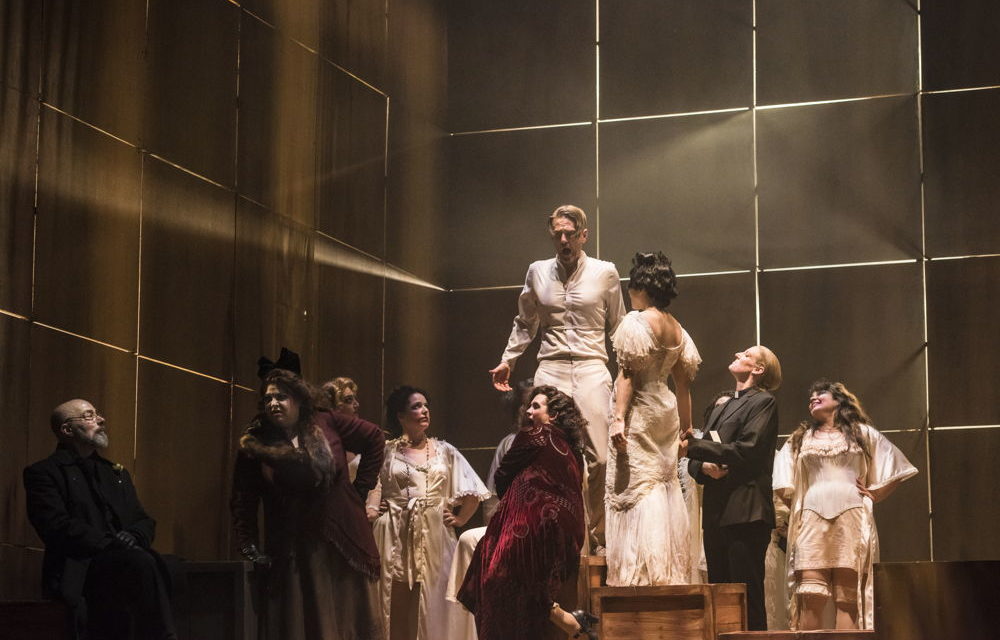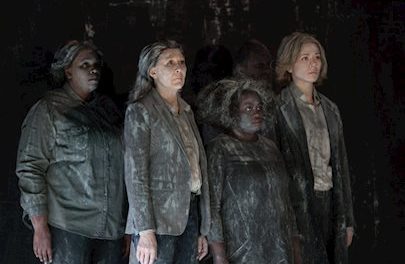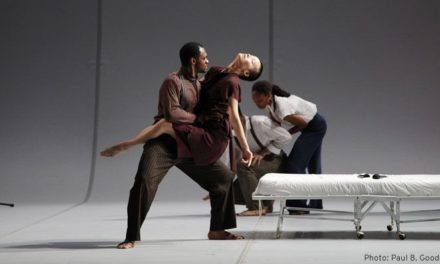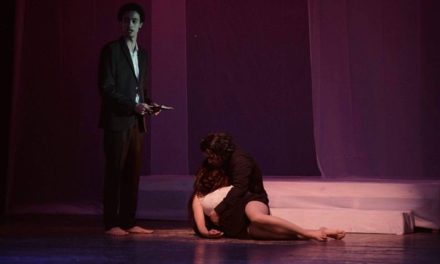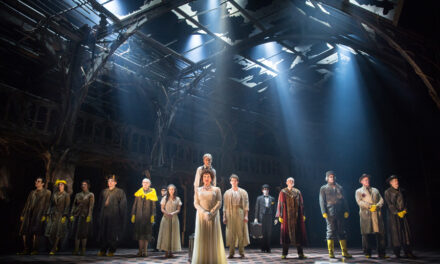On Friday, March 23rd, Boston Lyric Opera continued its run of The Threepenny Opera to a sold-out audience at the Huntington Avenue Theatre, another of new venue in a time of flux for the company as they seek a permanent home.
Kurt Weill and Bertolt Brecht’s 1930’s adaptation of John Gay’s The Beggars’ Opera imposed a Socialist moral on an essentially nihilist piece of unrepentant characters as Weill and Brecht had become increasingly interested in a Communist solution to the political strife of 1930’s Germany. Much like different revisions of Bernstein’s Candide, directors are faced with several editions and translations when mounting the production, since the composer and librettist themselves rewrote and rearranged much of it during their own lifetimes. For this run, an edition by Stephen Hinton and Edward Harsh with English lyrics written by Michael Feingold from 2000 was used.

Michelle Trainor as Mrs. Peachum. Photo Credit: Liza Voll.
Set, costumes and design beautifully conveyed a dark, seedy underground reflected in Weill’s plodding, gritty music but some combination of unclear direction and strange translation was chosen for an already flawed piece made for a muddled evening dramatically. The dialogue was clearly coached to go at a brisk pace and loud volume, but failed to sparkle with much intention. In fact, the translation and the direction only seemed to obscure the characters’ already unconventional motivations and musical numbers that have been rearranged over the years and distributed to different characters, further confused the dramatic arc. The piece itself is somewhat nebulous plot-wise, and this particular edition didn’t assist in captivating interest. The social commentary came across as an afterthought in a fairly dull evening. There were some nice moments despite this.
There was fine singing throughout, despite roles often lying in a low tessitura for those who normally sing operatic repertoire. Kelly Kaduce’s Polly Peachum had a Wednesday Adams/Beetlejuice interpretation of the character, which was apt given the Peachams’ unconventional morality as a family, and her comedic timing was often needed to punch up the dialogue. Kaduce sang expressively and beautifully, in as much as “Pirate Jenny,” a ballad about conspiring to murder all the men in a flophouse. She also successfully negotiated a significant amount of choreography in her scenes throughout.
Christopher Burchett possessed enough swagger and vocal luster to successfully pull off the anti-hero Macheath. Daniel Belcher had a clear, ringing baritone and his opening “Mack the Knife” was chillingly executed. The staging had him mock murdering figures facing upstage as Macheath sat in the corner covered in blood.
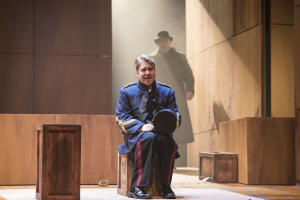
Daniel Belcher as Chief of Police Tiger Brown. Photo Credit: Liza Voll.
Chelsea Basler, as Lucy Brown stood out vocally among the cast, with the most ring in the hall, and her relatively brief turn onstage was polished and funny. Renee Tatum as Jenny Diver was vocally solid, but was directed about the stage more like a sorceress than a street-smart whore. If they were trying to drive home a true romance and ultimate betrayal between her character’s and MacHeath’s, it fell flat in semi-longing stares across stage at seemingly random moments.
James Maddalena’s morally warped dialogue as Mr. Peacham was as beautiful as his vocal prowess singing. Michelle Trainor, while committed to her acting as the brassy Mrs. Peacham, had to sing in a range too low for her normally dramatic soprano. The supporting cast were all strong and navigated unamplified dialogue as well as could be expected. Every word was understandable despite there being no super titles.
After several exciting and well-executed productions in the past few seasons, this unfortunately hearkens back to some of BLO’s less successful ventures, but also marks the beginning of a few more 20th century pieces to come in the future, including Bernstein’s Trouble in Tahiti at an ice rink in May, and a season of contemporary works like The Handmaid’s Tale written in 2000, upcoming. One can hope that with these, also come a tighter directorial vision.
This post was written by the author in their personal capacity.The opinions expressed in this article are the author’s own and do not reflect the view of The Theatre Times, their staff or collaborators.
This post was written by Katrina Holden-Buckley.
The views expressed here belong to the author and do not necessarily reflect our views and opinions.

